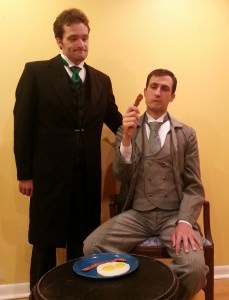The Fringe is rightly known and celebrated for giving people who may not be regular theater goers a chance to take a few bites of the performing-arts apple, with the hope and expectation that, once they get a taste of it, they’ll be hooked forever. Something very much like that must have happened a few years before Fringe—to be precise, in January 1875—when British dramatist Henry James Byron’s Our Boys became the first play in recorded history to run more than 500 performances. It would eventually rack up 1,362 after being sent to New York and Philadelphia to entertain and enlighten the cousins this side of the pond.

As the rotund and blustery county magnate Sir Geoffry Champneys, who tries to convince the beauteous heiress Violet Melrose that “there’s a concealed intellectuality” in the dishwater dullness of his pale, slim, bespectacled but billiard-loving ne’er-do-well son Talbot, Chuck Howell does a credible Richard Griffiths infused with a humor that easily slides from the sly to the pixieish.
Sally Frakes Cusenza makes a hilariously dry Clarissa, Sir Geoffrey’s sister, whose ability to cut through his contrived circumlocutions with withering salvos of caustic common sense is comical in a surprisingly contemporary sense. As Talbot, Rameen Chaharbaghi captures the uncertainty of a young man who has always been seen, and has seen himself, as superficial and immature, but realizes with incrementally approaching self-awareness that there’s more to him than that, and that time is running out for him to find it.
As the other “boy,” Charles Middlewick, the “aristocratic-looking son” of a retired butterman, Timothy Aaron Ziese is both a physical fit for the role and able to convincingly inhabit the character, whose learnedness and gentility stand in sharp contrast to Talbot’s supreme self-interest and general disdain for all things cultural. As Perkyn Middlewick, there’s something indefinably, impeccably “right” about the way Eric Henry combines the concerned, loving father and the practical-minded man of business into a human being as well as a character, a person we feel we know, because the actor knows him so intimately.
The ladies who are objects of the fathers’ designs for their sons are as definably different from each other as are their prospective suitors, but may not be so readily suited for the ones the fathers have chosen. As Violet Melrose, Jessica Powers-Heaven displays an easy, seemingly inborn charm and grace, undergirded by a quiet decisiveness and fortitude that will work in tandem with her more romantic but, in the end, equally capable cousin Mary, brought dynamically to life with verve and wit by Erin Gallalee.
Wendy A.F.G. Stengel is the consummate “downstairs” maid, Penelope Poddles, her broadly farcical facial mugging a perfect complement to her naughty, bawdy wisecracking. She also masters a character at the opposite end of the personality scale as the glumly downtrodden servant Belinda, who may evoke for those of a certain age “Laugh-In” comedian Ruth Buzzi’s Gladys. For his part, Carlton Maryott is a perfect complement, in the sense of likeness, to Belinda, recalling another sixties series with his Lurch-like, personality-drained portrayal of Sir Geoffrey’s servant Kempster. The costumes range from period- and character-perfect (the ladies’ flowered straw bonnets are a nice touch) to serviceable, and the British accents are variable, while the opening scene’s set both subtly suggests, and blatantly brays, the dualities and dichotomies to follow.
What, after all, can one say of a room with gold brocade loveseats and a delicate, classically styled walnut end table, set off by a prominent painting on the rear wall of a huge black hog in a grassy field—and a bulbous, glazed, pink ceramic pig, as artificial as its painted cousin is actual, extending three feet upwards from the end table? Perhaps, that it works as a meta-level metaphor for those most unlikely, ill-matched couples. And their fathers’ ill-designed, and fortunately ill-fated determination to force their “boys” to do what they assure them is best for them—but is really best only for themselves, or the people they see their sons, or want their sons, to be.
Something that we, in the “enlightened” 21st century, of course would never dream of doing. (Dream on?)
Running time: 85 minutes.
Our Boys plays though July 28, 2013 at Mount Vernon United Methodist Church at the Mountain – 900 Massachusetts Avenue, NW, in Washington, DC. For performance and ticket information, visit the show’s Capital Fringe page.
LINK
2013 Capital Fringe Show Preview: ‘Our Boys’ by Victorian Lyric Opera Company.





